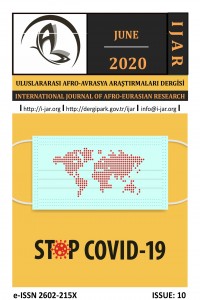COVİD-19, BAŞARISIZ KAMU POLİTİKALARI, ÖNE ÇIKAN EGEMENLİK ARZUSU ve PARÇALANAN BİRLİKLER: AVRUPA BİRLİĞİ ÖRNEĞİ
Öz
Temeli Schuman Deklarasyonu ile atılan Avrupa Birliği (AB), yaklaşık yetmiş yıllık bir birikimin ardından günümüzde pek çoklarınca eşi benzeri görülmemiş bir bütünleşme örneği olarak değerlendirilmektedir. Zira Altılar adı verilen Belçika, Hollanda, Lüksemburg, Almanya, Fransa ve İtalya’nın Avrupa’da yeni bir güç mücadelesinin önüne geçmek için başlattığı girişim süreç içerisinde ülkelere büyük kazanımlar sağlamış, üye ülkelerin kazanımlarını gören diğer ülkeler, birliğe üye olabilmek adına âdeta birbirleriyle yarışmıştır. Ülkeler, üyelik için birbirleriyle yarışırken; ekonomik temelli bütünleşme siyasi, sosyal ve kültürel bütünleşmeyle desteklenmiş ve bu süreç içerisinde AB, kendi değer ve normlarını yaratmayı başarmıştır. Bu değer ve normlardan bir tanesi de sağlık olmuştur. AB sağlık alanında oluşturduğu değer ve normlarla üye ve aday ülkelere kurumsal olarak yol gösterici olmaya çalışmıştır. Kurulduğu günden günümüze dek pek çok sorunla karşı karşıya kalan birlik, ilk defa bir salgın hastalıkla mücadele etmek zorunda kalmış ve süreç sonuçlanmamış olmasına rağmen bu mücadelede de başarısız olmuştur. Zira başta İtalya, İspanya, Portekiz ve Macaristan olmak üzere birliğe üye pek çok ülke mücadelede kurumsal bir çaba göstermeyen, merkez bankası aracılığıyla para basma kararı alarak üye ülkeleri fonlama dışında herhangi bir somut çabası görülmeyen AB’yi resmi yetkilileri aracılığıyla ağır bir şekilde eleştirmiş, bazıları AB’yi birlikten ayrılmakla âdeta tehdit etmiştir. Bütün süreç boyunca başarısız bir sağlık politikası izleyen AB, birlik olarak başarısız olunca üye ülkeler kendi kaderlerini yaşamak zorunda kalmış ve bu sürecin doğal sonucu olarak birlik düşüncesi zedelenerek ulusal egemenlik düşüncesi ön plana çıkmıştır. Sonuçta AB, parçalanmış bir görüntü sergilemiş ve bu görüntü, birliğin parçalanacağı düşüncesini belirginleştirmiştir.
Anahtar Kelimeler
Kaynakça
- Akdoğan, A. A. Akdoğan (2011), ‘Türkiye’de Kamu Politikası Disiplinin Tarihsel İzleri’, içinde Filiz Kartal, (der.) Türkiye’de Kamu Yönetimi ve Kamu Politikaları, (Ankara: TODAİE). Kuchins, A.C. (2006), “Russian Democracy and Civil Society: Back to the Future “Senior Associate, Russian and Eurasian Program Carnegie Endowment for International Peace Testimony Prepared for U.S. Commission on Security and Cooperation in Europe . Surkov,V.(2008),http://www.ereading.me/bookreader.php/73463/Suverennaya_demokratiya__ot_idei_k_ doktrine._Sbornik_stateii.html#note_1 Erişim tarihi: 09.02.2020. Thomas R. D. (1987), Understanding Public Policy, (New Jersey: Prentice-Hall Inc.). Turgay E.(2004), Kamu Yönetimi: Kuram, Siyasa, Uygulama, (Ankara: TODAİE). https://www.aydinlik.com.tr/haber/ab-yi-bol-exit-li-gunler-bekliyor-204714-6 (23.04.2020) (https://www.avrupa.info.tr/tr/herseyin-basi-saglik-45, (23.04.2020) https://www.ab.gov.tr/93.html, (23.04.2020)
COVID-19, UNSUCCESSFUL PUBLIC POLICIES, PROMINENT DESIRE FOR SOVEREIGNTY AND DISINTEGRATING UNIONS: A CASE OF THE EUROPEAN UNION
Öz
The European Union (EU) of which the foundation was laid by the Schuman Declaration has been considered as a unique example of integration after nearly seventy years of experience by many people. However, the attempted process of preventing power struggle in Europe initiated by Belgium, Netherlands, Luxembourg, Germany, France and Italy called as the Six provided major gains for the countries and other countries realizing the achievements of the member countries simply competed against each other in order to be a member of the Union. While the countries were competing for membership, economic-based integration was supported by political, social and cultural integration, and the EU managed to create its own values and norms during the process. One of these values and norms is healthcare. The EU has tried to be provide guidance to the member and candidate countries through the values and norms established in the field of healthcare. Having faced many problems since its foundation, the union was forced to fight a pandemic for the first time, and even if the process has not been concluded, the EU has failed in this struggle. Many countries, including Italy, Spain, Portugal and Hungary, have heavily criticized the EU via its official authorities for not making an institutional effort in the struggle, and for not making any concrete efforts except for funding the member states by making a decision to print money through the central bank. Some of the countries have threatened the EU with leaving the Union. Following an unsuccessful health policy during the process, the EU failed as a union and the member countries had to live their own faiths. The idea of unity has been undermined and the idea of sovereignty has come to the forefront as a natural consequence. As a result, the EU has presented a fragmented image making the idea of breaking up clear.
Anahtar Kelimeler
European Union Covid-19 Sovereign Democracy Sovereignty Public Policy
Kaynakça
- Akdoğan, A. A. Akdoğan (2011), ‘Türkiye’de Kamu Politikası Disiplinin Tarihsel İzleri’, içinde Filiz Kartal, (der.) Türkiye’de Kamu Yönetimi ve Kamu Politikaları, (Ankara: TODAİE). Kuchins, A.C. (2006), “Russian Democracy and Civil Society: Back to the Future “Senior Associate, Russian and Eurasian Program Carnegie Endowment for International Peace Testimony Prepared for U.S. Commission on Security and Cooperation in Europe . Surkov,V.(2008),http://www.ereading.me/bookreader.php/73463/Suverennaya_demokratiya__ot_idei_k_ doktrine._Sbornik_stateii.html#note_1 Erişim tarihi: 09.02.2020. Thomas R. D. (1987), Understanding Public Policy, (New Jersey: Prentice-Hall Inc.). Turgay E.(2004), Kamu Yönetimi: Kuram, Siyasa, Uygulama, (Ankara: TODAİE). https://www.aydinlik.com.tr/haber/ab-yi-bol-exit-li-gunler-bekliyor-204714-6 (23.04.2020) (https://www.avrupa.info.tr/tr/herseyin-basi-saglik-45, (23.04.2020) https://www.ab.gov.tr/93.html, (23.04.2020)
Ayrıntılar
| Birincil Dil | Türkçe |
|---|---|
| Bölüm | Makaleler |
| Yazarlar | |
| Yayımlanma Tarihi | 30 Haziran 2020 |
| Yayımlandığı Sayı | Yıl 2020 Cilt: 5 Sayı: 10 |
All rights reserved. International Journal of Afro-Eurasian Research (IJAR) is an International refereed journal and published biannually. Authors are responsible for the content and linguistic of their articles. Articles published here could not be used without referring to the Journal. The opinions in the articles published belong to the authors only and do not reflect those of International Journal of Afro-Eurasian Research.


